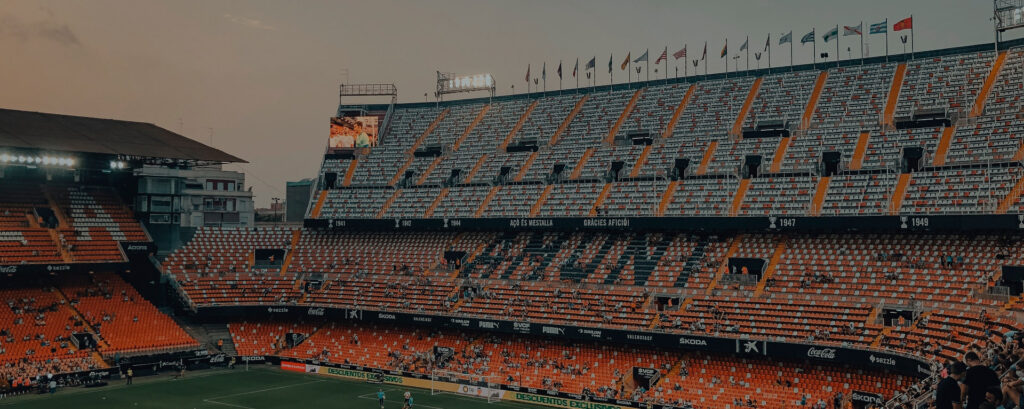Meet Tomás Arroba:
Meet Tomás Arroba, Marketing Director of Rayo Vallecano and lecturer at ESBS Madrid.
Tomás has had a very exciting career in marketing and sponsorship for professional football clubs, starting with UCAM Murcia CF, passing through Alcorcón CF, and now Rayo Vallecano.
In addition, we have been able to have Tomás as a teacher of Branding, Sponsorship, and Public Relations at the ESBS Madrid campus.
In this interview you can get to know him a little better and learn about the specialisation of sports marketing, how it differs from general marketing, the challenges of the marketing department at Rayo, and what advice he would give to students who want to specialise in sports marketing.
Thank you, Tomás!
ESBS: Hi, Tomás! Could you introduce yourself and share with us a bit about your professional background?
Tomás: Hi, I’m Tomás Arroba and I’m a lecturer here at European Sport Business School. This year I have taught the Branding, Sponsorship, and Public Relations modules. As for my professional background, right now I am the Marketing and Sponsorship Director of Rayo Vallecano and this is my 7th season in professional football. I started in UCAM Murcia when it was in the Second Division. From there I moved on to Alcorcón and I spent four seasons, two of them as Marketing Manager and another two as Head of Sponsorship for the club. And from there I went on to where I am now, Rayo Vallecano.
ESBS: Nowadays, marketing is one of the key areas in any organisation. From your perspective and experience, what would you say are the main differences between conventional marketing and sports marketing?
Tomás: As you say, marketing is a fundamental area in every company. As a fundamental area, it always tries to satisfy the needs of any type of client, whether in the sports sector or in any other sector. The main difference I see, although they are slightly similar, is that the brand must focus on the emotions of the end customer. But in sport, and especially in football, those emotions are much more lasting and much more intense. Although, well, colloquially, sports marketing includes all advertising, activations, sponsorships, any business channel that we can think of comes to us through sports marketing. It’s like an all-purpose drawer situation (laughs).
ESBS: As marketing director of Rayo Vallecano, what has been your biggest challenge in this role at the marketing level?
Tomás: Well, at Rayo, the main challenge was to come in and do an audit of how the brand was internally and externally. Assets that we had, assets that were already active, and then also the relationship with suppliers and sponsors, which at that time was different. And to try to standardise, to try to improve, and to be able to achieve this improvement in the position we were in at that time, so that in the future we could build a better relationship both with the sponsors and with the suppliers we had and still have, and so that little by little and word of mouth would make us grow and improve in order to be able to reach more sponsors and more suppliers.
ESBS: We know that you have recently completed your PhD in sports marketing (congratulations!): Could you tell us a bit about your PhD and how you have been able to apply it to your professional life as Marketing Director?
Tomás: First of all, thank you very much. Well, what I have tried to do is to give the fan more power within the football industry. For me it is the main asset of this sector. Doing a little bit of an analysis of the situation of the teams in the Madrid region, because at the end of the day, that’s the market I’m in. I was looking at how those fans felt about their club and in what areas they thought their club needed to improve.
Then, based on this market analysis, we looked for strategies and we looked for different ways in which if the club was well positioned it should continue to work on that, and if it wasn’t, it had to pay more attention to what the fans were saying.
I know it is very typical and it is often said that the fan is in the centre. From my point of view, right now they are not. And well, a bit of rebellion, of fighting against the situation to try to put the amateur in the centre with scientific study and putting it into practice as much as possible.
Because one thing is what is on paper and another thing is what can be implemented, because each context and each situation of each team is different. But if one day I succeed, I want the fan to be the protagonist of this sector.
ESBS: Like many of our students, at the end of your degree, you specialised in sports management – what would you recommend to a student who is just starting their education and wants to enter the sports industry?
Tomás: First of all, to never stop specialising in the subject. One can never stop, you always have to keep learning because everything changes and it changes very quickly, you have to keep adapting.
And secondly, because it’s such a small and closed market, try to add value in any way you can. If you see that a problem has been identified in this sector or in a team, because you are a fan, try to help. If you bring value and you make them grow and bring solutions to the place where you want to work at, it’s easier than if you just go with your CV and say, “Hey! Here I am”.
